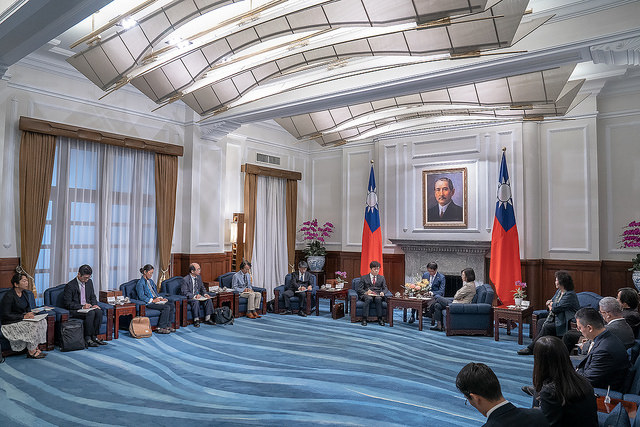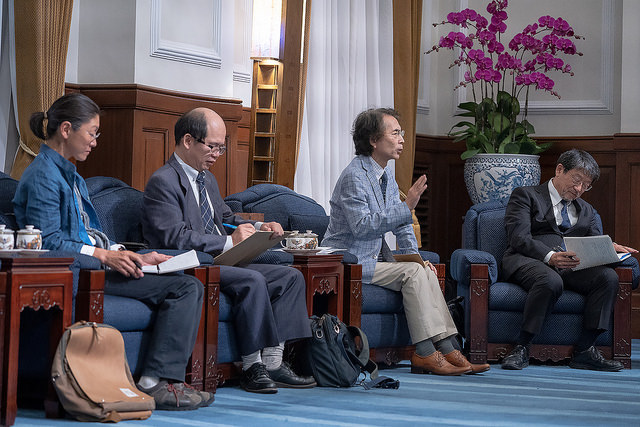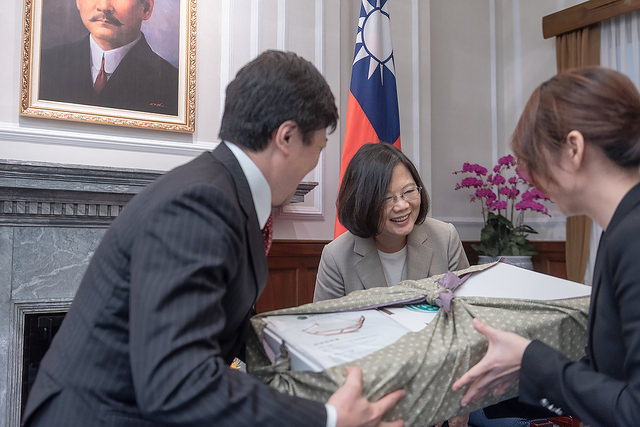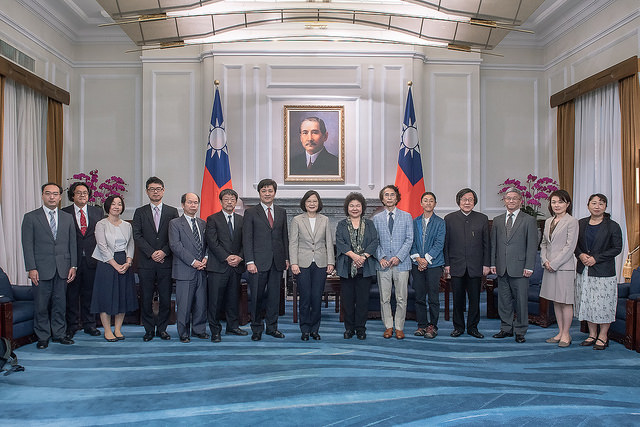News & activities
 News releases
News releases
On the morning of September 4, President Tsai Ing-wen met with a delegation from the University of Tokyo's cross-strait relations research group led by Professor Matsuda Yasuhiro. The president emphasized that Taiwan will continue seeking opportunities to cooperate with Japan to expand collaboration and markets in third countries to create win-win situations.
In remarks, President Tsai noted that the University of Tokyo's cross-strait relations research group has long been concerned about Taiwan politics and cross-strait issues. Two years ago, the president recalled, she met and exchanged views with Professor Matsuda and several others in the delegation. She said she was delighted to meet with them again, and exchange ideas with the delegation members.
President Tsai mentioned that when they previously met, she had only been in office for three months, and that everyone was concerned about the challenges facing the Taiwan government. For the past two years, she said, the government has actively addressed problems left over from previous administrations like pension reform for military personnel, public servants, and public school educators, alleviating the government's prolonged fiscal crisis and establishing a sustainable system. At the same time, the government is pursuing transitional justice to bring the truth to light, assess responsibility, and achieve reconciliation so that Taiwanese society can move forward and deepen the democratic values we cherish.
Commenting on cross-strait relations, the visiting group's focus, President Tsai stated that Taiwan's position has never changed. Taiwan will always fulfill its regional security responsibilities by maintaining stable, consistent, and predictable cross-strait relations. However, responsibility for maintaining the status quo is not Taiwan's alone, said the president. She then expressed confidence that everyone has seen that China is steadily ratcheting up the pressure on Taiwan.
President Tsai stated that China has dispatched military aircraft and naval vessels to circle Taiwan, prevented Taiwan from taking part in international activities, and even lured away Taiwan's diplomatic allies. These acts, she said, are all attempts to undermine the status quo and introduce uncertainty into the cross-strait relationship, posing a threat to regional peace and stability.
The president then thanked our Japanese friends from all quarters of society who have spoken in Taiwan's defense when China forced international airlines to change their designation for Taiwan, deprived Taichung City of its right to host next year's East Asian Youth Games, and enticed El Salvador to switch diplomatic ties. Taiwan will nevertheless continue cooperating with other like-minded countries to maintain peaceful development in the region, she said.
President Tsai pointed out that Taiwan and Japan share fundamental values like freedom and democracy, with a partnership that's important to both sides. In addition to frequent people-to-people exchanges, the president also expressed hope that the governments of Taiwan and Japan can interact more so that together, they can play a more active role in regional economic and trade integration and security.
Commenting on economic and trade ties, President Tsai said that Taiwan can learn from Japan's experience in joining the Comprehensive and Progressive Agreement for Trans-Pacific Partnership (CPTPP) and enhancing relations with Southeast Asian countries. She also mentioned that Taiwan and Japan should have more interaction and exchanges on international cooperation. A few days earlier, she said, the Japan-ROC Diet Members' Consultative Council adopted a resolution calling for cooperation between Taiwan and Japan in third countries. "We're on the same page about that issue," she said.
And finally, President Tsai emphasized that Taiwan will continue seeking opportunities to cooperate with Japan so that the two countries can act on their ideas and expand collaboration and markets in third countries to create win-win situations. Noting that all her visitors are important links between Taiwan and Japan, the president said she hopes that they will tap into the power of academia and the private sector to support Taiwan.












